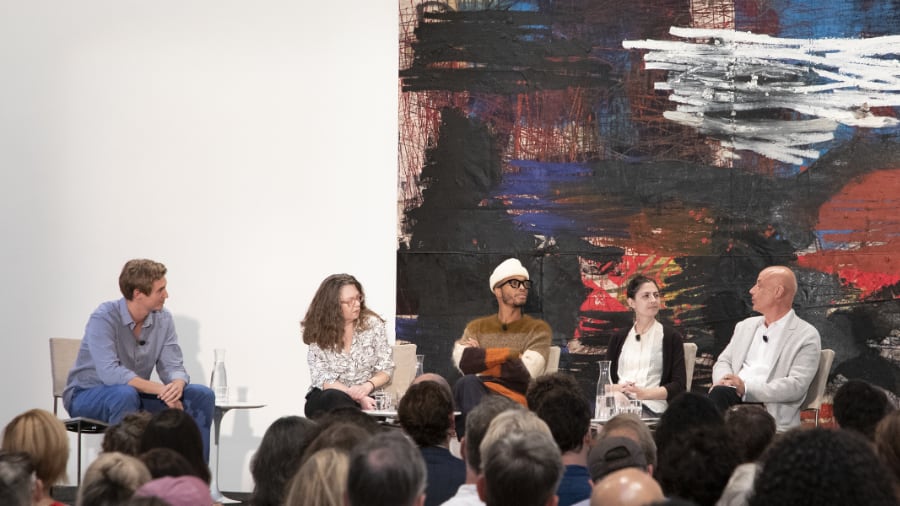
On September 23, 2019, The New York Review of Books and David Zwirner Books held the first in a four-part series of public talks bringing together leading writers, artists, and thinkers to explore the role of power within the cultural sphere.
The series launched with “The Power of the Critic,” a conversation about the evolving role of critics, publications, and media in making taste, careers, and canons, with Manohla Dargis (co-chief film critic for The New York Times), Antwaun Sargent (independent writer and critic and author of The New Black Vanguard: Photography between Art and Fashion), Jillian Steinhauer (art critic for The New York Times), and Daniel Mendelsohn (editor-at-large of The New York Review), moderated by Lucas Zwirner (head of content of David Zwirner).
Below are some excerpts from the discussion, and a video recording of the event. (Excerpts have been edited and condensed.)
On critics as outsiders:
Lucas Zwirner: I thought I would begin by asking what it has been like to see yourselves move from the periphery of the critical landscape—meaning, writing for smaller publications and freelance—and shift into power centers.
Manohla Dargis: I live in Los Angeles, so, being 3,000 miles away, I can pretend that I’m not in the power center. But I’m very aware of it. When I first started at the Times, I had a horrible moment when I realized “Oh, I’m The Man! Ugh.” I had started at the Village Voice and then moved to the LA Weekly, alternative newspapers. I was used to that position and it was upsetting not to be, and then I had to adjust.
Daniel Mendelsohn: I think the question is not about a career arc, but about a positioning as a critic. You have to be standing outside of the phenomenon that you’re describing because that’s what gives you the perspective to be able to think.
On the consequences of positive and negative reviews:
Jillian Steinhauer: The more time you spend in an industry, the more people you know. The more I know gallery owners, the more I wonder: What’s the right line to put up? If I review their shows, what does that mean? And those questions become more complicated the more you do it.
DM: There’s the famous problem of running into people at book parties when you trashed their book. It’s a real-life phenomenon of which that is an extreme example.
JS: Or you didn’t trash the book and you feel that you should have. It’s also a question of honesty.
On presenting artists’ work to readers:
LZ: Antwaun, I’m curious how you see your role, as a young critic, in terms of drawing attention to the work versus making critical statements about it?
Antwaun Sargent: So many of the artists that I write about have not previously had any sort of exposure. It’s unfair to engage in a formal kind of criticism without someone being able to state their case. I don’t really think you get a lot out of that, on both ends of the spectrum, if you’re not allowing the artists to say what they want about their work first.
On “thumbs up” criticism:
MD: Do you ever feel like a seller? Because there was an editor who used to always ask me to make sure I put a little word in the first sentence so everyone knew if I liked the movie or didn’t. But I just wanted them to read me. Maybe they’ll figure it out from my enthusiasm around writing, but I want them to know in my own sweet time.
DM: What always gets eroded is any possibility of complexity. Thumbs up, thumbs down, five stars, one star—this is idiotic, right? Because most things are mixed. Don’t tell them everything in the first paragraph—because you liked certain things but not others, and that’s how most things are. If the whole discourse becomes “like/not like,” that’s not conducive to anything interesting.
On the question of expertise:
AS: I think there is an over-education thing happening right now. I’m not saying that you shouldn’t go to school, but you might not need a Ph.D. For me, there was a motivation to think critically about the stuff I was seeing, and some of the conversations I was having with artists in their studios.
JS: I’ve been thinking a lot lately about how most critics, up until very recently, have been white, and mostly men. When you talk about expertise, it also opens up a conversation about who gets to be an expert, who is trusted with being an expert, who is considered an authority.
DM: Did Pauline Kael have a degree in film? I don’t think so. Expertise can be overrated. If you’re interested in something, you can develop your own expertise. There’s a strange alchemy that transforms what you know into something interesting about the subject, and not everybody can do that.
Advertisement
The next discussion in this series, “The Power of the Artist,” will be held at David Zwirner in New York in early 2020. Please sign up for the Review’s email newsletter to receive information about this and other events.

